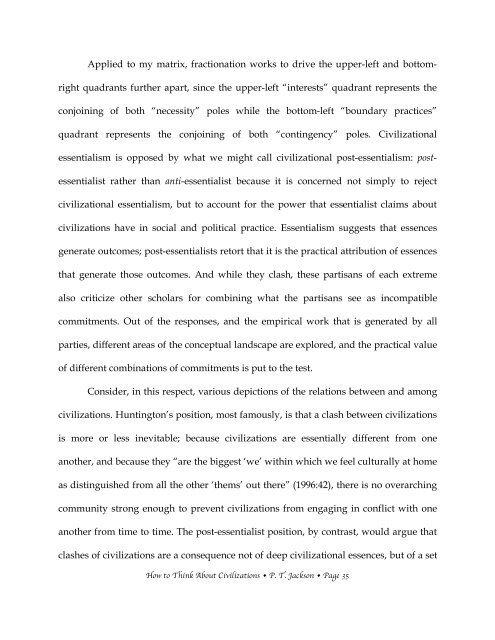How to Think About Civilizations - The Watson Institute for ...
How to Think About Civilizations - The Watson Institute for ...
How to Think About Civilizations - The Watson Institute for ...
You also want an ePaper? Increase the reach of your titles
YUMPU automatically turns print PDFs into web optimized ePapers that Google loves.
Applied <strong>to</strong> my matrix, fractionation works <strong>to</strong> drive the upper-left and bot<strong>to</strong>mright<br />
quadrants further apart, since the upper-left “interests” quadrant represents the<br />
conjoining of both “necessity” poles while the bot<strong>to</strong>m-left “boundary practices”<br />
quadrant represents the conjoining of both “contingency” poles. Civilizational<br />
essentialism is opposed by what we might call civilizational post-essentialism: postessentialist<br />
rather than anti-essentialist because it is concerned not simply <strong>to</strong> reject<br />
civilizational essentialism, but <strong>to</strong> account <strong>for</strong> the power that essentialist claims about<br />
civilizations have in social and political practice. Essentialism suggests that essences<br />
generate outcomes; post-essentialists re<strong>to</strong>rt that it is the practical attribution of essences<br />
that generate those outcomes. And while they clash, these partisans of each extreme<br />
also criticize other scholars <strong>for</strong> combining what the partisans see as incompatible<br />
commitments. Out of the responses, and the empirical work that is generated by all<br />
parties, different areas of the conceptual landscape are explored, and the practical value<br />
of different combinations of commitments is put <strong>to</strong> the test.<br />
Consider, in this respect, various depictions of the relations between and among<br />
civilizations. Hunting<strong>to</strong>n’s position, most famously, is that a clash between civilizations<br />
is more or less inevitable; because civilizations are essentially different from one<br />
another, and because they “are the biggest ‘we’ within which we feel culturally at home<br />
as distinguished from all the other ‘thems’ out there” (1996:42), there is no overarching<br />
community strong enough <strong>to</strong> prevent civilizations from engaging in conflict with one<br />
another from time <strong>to</strong> time. <strong>The</strong> post-essentialist position, by contrast, would argue that<br />
clashes of civilizations are a consequence not of deep civilizational essences, but of a set<br />
<strong>How</strong> <strong>to</strong> <strong>Think</strong> <strong>About</strong> <strong>Civilizations</strong> • P. T. Jackson • Page 35
















